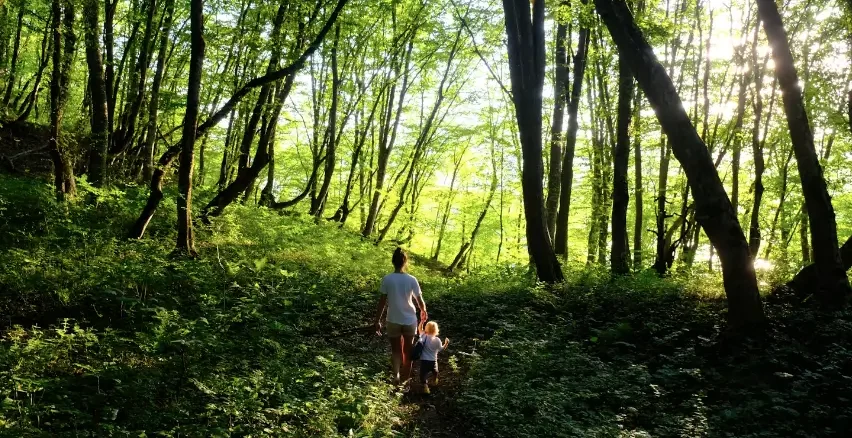
In the hustle and bustle of modern life, finding moments of tranquillity and connection with nature can be a challenge. Yet, in Japan, there exists a centuries-old practice that offers a remedy for the stresses of urban living: shinrin-yoku, or forest bathing. This ancient tradition, rooted in the wisdom of nature, provides a sanctuary of serenity amidst the chaos of contemporary existence.
Shinrin-yoku invites individuals to immerse themselves in the natural environment, particularly dense forests, with a focus on mindfulness and sensory awareness. Originating in Japan in the 1980s, forest bathing has gained recognition worldwide for its therapeutic effects on both physical and mental well-being. Let’s delve into the art and science behind this ancient practice and discover its profound benefits for health and well-being.

The Essence of Forest Bathing
Shinrin-yoku, or forest bathing, is a practice that goes beyond simply walking in the woods; it’s about fully immersing oneself in the natural environment with a mindful and open-hearted presence. Originating in Japan in the 1980s, forest bathing was developed in response to the fast-paced and highly stressful urban lifestyle that many Japanese people were experiencing. Recognising the inherent healing power of nature, researchers and practitioners began to explore the idea that spending time in forests could promote relaxation, reduce stress, and improve overall well-being.
The practice of forest bathing involves engaging all five senses while being surrounded by the sights, sounds, and scents of the forest. It’s about slowing down, tuning into the present moment, and allowing oneself to be fully absorbed by the natural world. Participants may engage in activities such as mindful walking, deep breathing, or simply sitting quietly and observing the surroundings.

One of the key principles of forest bathing is the concept of “shinrin-yoku no waza,” or the art of forest bathing. This involves cultivating a state of deep relaxation and receptivity, allowing the healing properties of the forest to work their magic. Studies have shown that spending time in nature, particularly in dense forests rich in phytoncides (antimicrobial compounds emitted by trees), can have a range of health benefits, including reducing blood pressure, boosting the immune system, and improving mood and cognitive function.
In addition to its physical health benefits, forest bathing is also believed to have profound effects on mental and emotional well-being. The practice encourages mindfulness and self-awareness, helping individuals to let go of stress, anxiety, and negative thought patterns. Many people report feeling a sense of peace, tranquillity, and connectedness with nature after engaging in forest bathing, which can have long-lasting effects on their overall outlook on life.
As awareness of the therapeutic benefits of forest bathing continues to grow, so too does its popularity around the world. From Japan to North America to Europe, people are seeking out opportunities to experience the restorative power of nature firsthand. Whether through guided forest bathing sessions, solo hikes in the wilderness, or simply spending more time outdoors in green spaces, individuals are discovering the profound impact that immersing oneself in nature can have on mind, body, and spirit.
In a world that often feels increasingly disconnected from the natural world, forest bathing offers a powerful reminder of our deep connection to the Earth and the healing potential that surrounds us. By embracing the practice of shinrin-yoku and making time to commune with nature on a regular basis, we can nurture our well-being, cultivate inner peace, and foster a deeper appreciation for the beauty and wonder of the natural world.
The Healing Power of Nature
Scientific research has shed light on the remarkable health benefits of forest bathing, providing compelling evidence for its therapeutic effects on both mind and body. Numerous studies conducted around the world have consistently demonstrated the positive impact of spending time in nature, particularly in dense forests, on various aspects of human health and well-being.

One of the most well-documented benefits of forest bathing is its ability to reduce stress levels. Cortisol, often referred to as the body’s primary stress hormone, plays a central role in the body’s response to stress. Elevated levels of cortisol have been linked to a wide range of health issues, including anxiety, depression, and cardiovascular disease. Studies have shown that spending time in nature, away from the hustle and bustle of urban life, can lead to a significant reduction in cortisol levels, helping to alleviate stress and promote relaxation.
In addition to lowering cortisol levels, forest bathing has been shown to have a positive impact on blood pressure. High blood pressure, or hypertension, is a major risk factor for heart disease, stroke, and other serious health conditions. Research indicates that spending time in natural environments, such as forests, can lead to a decrease in blood pressure, even in individuals with hypertension. The calming effects of nature, combined with the gentle exercise involved in activities like walking or hiking, help to promote cardiovascular health and reduce the risk of hypertension-related complications.
Forest bathing has been found to improve mood and emotional well-being. Serotonin and dopamine are neurotransmitters commonly associated with feelings of happiness, pleasure, and relaxation. Studies have shown that spending time in nature can increase the production and release of these “feel-good” chemicals in the brain, leading to improvements in mood and overall mental health. The tranquillity of the forest environment, coupled with the sensory experiences it offers, can evoke a sense of calm and contentment that enhances emotional resilience and fosters a positive outlook on life.

Moreover, forest bathing has been linked to enhanced immune function, bolstering the body’s natural defences against illness and infection. Phytoncides, volatile organic compounds emitted by trees and plants, have been shown to have antimicrobial properties and immune-boosting effects. Breathing in these phytoncides during forest bathing stimulates the production of white blood cells, which play a critical role in the body’s immune response. As a result, regular exposure to forest environments can help strengthen the immune system and reduce the risk of illness.
The scientific evidence overwhelmingly supports the health benefits of forest bathing, highlighting its potential to reduce stress, lower blood pressure, improve mood, and enhance immune function. By immersing ourselves in the natural beauty of forests and embracing the principles of shinrin-yoku, we can tap into nature’s healing power and experience a profound sense of well-being that transcends the physical and mental challenges of modern life.
Mindfulness in Motion
At the heart of forest bathing lies the practice of mindfulness, a fundamental principle that invites participants to cultivate a profound sense of presence and awareness in their natural surroundings. Mindfulness involves intentionally focusing attention on the present moment, free from judgment or distraction, and engaging the senses in a state of relaxed receptivity.

During a forest bathing session, participants are encouraged to slow down the pace of their lives and attune themselves to the rhythms of nature. Through deep, conscious breathing and deliberate movement, they begin to shift out of the habitual patterns of thought and behaviour that characterise everyday life. This intentional slowing down allows individuals to enter a state of heightened sensitivity, where even the smallest details of the forest environment come alive with vibrant clarity.
Engaging the senses is a central aspect of the mindfulness practice in forest bathing. Participants are invited to explore the forest with open curiosity, using their senses as guides to the richness of their surroundings. They may observe the intricate patterns of sunlight filtering through the canopy, listen to the symphony of bird calls and rustling leaves, feel the texture of moss-covered rocks beneath their fingertips, inhale the earthy scent of damp soil and pine needles, and even taste the sweetness of wild berries or the freshness of the forest air.
By immersing themselves in this multi-sensory experience, participants foster a deep sense of connection with the forest ecosystem and all its inhabitants. They come to appreciate the interplay of light and shadow, the intricate patterns of plant and animal life, and the ever-changing rhythms of the natural world. Through mindful observation and exploration, they develop a profound respect for the inherent beauty and complexity of nature, cultivating a sense of reverence and awe for the interconnected web of life that surrounds them.
The practice of mindfulness in forest bathing extends beyond mere sensory awareness; it also encompasses an attitude of non-judgmental acceptance and compassion towards oneself and the natural world. As participants let go of expectations and agendas, they open themselves up to a deeper experience of connection and belonging. They come to realise that they are not separate from nature, but rather an integral part of it, bound together in a sacred dance of life.
In this way, the practice of mindfulness in forest bathing serves as a gateway to a deeper understanding of oneself and the world around us. By cultivating a mindful presence in the forest, participants tap into a wellspring of wisdom and insight that transcends the limitations of the rational mind. They come to appreciate the profound interconnectedness of all things and the inherent beauty of existence, fostering a sense of peace, harmony, and inner fulfilment that extends far beyond the boundaries of the forest itself.
Cultivating a Sense of Awe

The experience of awe and wonder in forest bathing goes beyond mere appreciation of the natural surroundings; it encompasses a deep sense of reverence and interconnectedness with the natural world. As participants immerse themselves in the majesty of towering trees, babbling brooks, and dappled sunlight filtering through the canopy, they undergo a profound shift in perspective that transcends the boundaries of the self.
At the heart of this transformative experience is the realisation of the interconnectedness of all living things. In the serene embrace of the forest, individuals are reminded of their place within the web of life, where every organism, from the smallest insect to the mightiest tree, plays a vital role in sustaining the delicate balance of ecosystems. This recognition of interconnectedness fosters a sense of humility and reverence for the intricate tapestry of life that surrounds us.
The experience of awe and wonder in forest bathing is often accompanied by a heightened awareness of the present moment. As participants tune into the sights, sounds, and sensations of the forest, they become fully immersed in the richness of their surroundings, letting go of worries, distractions, and preoccupations. In this state of mindful presence, time seems to stand still, and the boundaries between self and nature dissolve, giving rise to a profound sense of unity and belonging.
In addition to its spiritual and existential dimensions, the experience of awe and wonder in forest bathing has tangible psychological and physiological effects. Research has shown that moments of awe can lead to increased feelings of generosity, compassion, and altruism, as well as improvements in overall well-being and life satisfaction. Furthermore, awe-inducing experiences have been associated with reductions in inflammation, stress levels, and symptoms of anxiety and depression, highlighting the profound impact of nature on mental and physical health.

As individuals emerge from their forest bathing experience, they carry with them a sense of awe-inspired gratitude and reverence for the natural world. This newfound appreciation for the beauty and interconnectedness of all living things serves as a source of inspiration and motivation to protect and preserve the precious ecosystems that sustain life on Earth. By cultivating a deeper connection with nature through practices like forest bathing, we can cultivate a more harmonious relationship with the planet and foster a greater sense of well-being for ourselves and future generations.
Incorporating forest bathing into one’s lifestyle can be as simple as taking regular walks in natural settings, practising meditation outdoors, or participating in guided forest bathing sessions led by certified guides.
As our lives become increasingly dominated by technology and urbanisation, the practice of forest bathing offers a powerful antidote to the stresses of modern living. By immersing ourselves in the healing embrace of nature, we can reconnect with our innate sense of calm, vitality, and connection to the world around us. Whether through a leisurely stroll in the woods or a contemplative meditation beneath the canopy, let us embrace the art of shinrin-yoku and rediscover the profound healing power of the forest.
SheSociety is a site for the women of Australia to share our stories, our experiences, shared learnings and opportunities to connect.

Leave a Reply